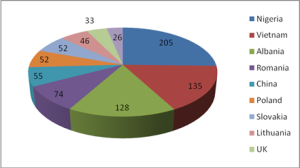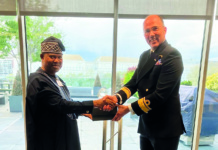
Friday, 18 October, marks Anti-Slavery Day. Figures show that the top ten source countries for trafficking are Nigeria, Vietnam, Albania, Romania, China, Poland, Slovakia, Lithuania and the UK.
Earlier this year, the Department of Health launched new training and guidance designed to make it easier for NHS staff to spot and give help to people who have been illegally trafficked.
Produced in conjunction with leading women’s charity Platform 51 and a steering group of health professionals, these tools help doctors, nurses and other health workers to be better equipped to spot the signs of trafficking and to know what to do if they think a patient might be a victim. Tell-tale signs could include someone who is afraid to speak to a doctor or nurse, or reluctant to explain how an injury occurred. A victim may also be vague when explaining where they live, work or go to school or be with someone who insists on speaking for them.
In many cases, victims need treatment for health problems, so NHS staff are uniquely placed to spot, treat and support victims of trafficking. If medical staff have concerns about a possible victim, and need more advice, they can contact the Salvation Army who offer a wide range of support, which includes securing accommodation, counselling and assistance with asylum applications or voluntary repatriation.
Last year, 1,186 potential victims of trafficking were identified through the UK’s victim support framework the National Referral Mechanism. This is an increase of 25 per cent compared to 2011 – but due to difficulties in recognising victims it is likely many more could be helped.
Victims of human trafficking can be men, women or children, who are often brought from abroad against their will. Most are then forced to work or are sexually exploited. Foreign nationals make up the majority of those who are trafficked but UK residents can also be trafficked around the country and abroad.
The Home Secretary, Theresa May, has asked Frank Field MP, in his role as vice-chair of the Human Trafficking Foundation and as a member of the Advisory Council to the Centre for Social Justice, to lead an urgent public debate about practical and effective ways of ending modern slavery in the UK.
The evidence sessions will be hosted by the Centre for Social Justice over the next two months, while the Human Trafficking Foundation has agreed to bring in key witnesses from abroad to help draw on best practice. The findings will feed into a draft Modern Slavery Bill that the government intends to publish this session for pre-legislative scrutiny. The aim is to introduce a Bill next session that could be passed and on the statute books by the end of this Parliament. Home Secretary Theresa May said:
“We must all work together if we are to end the scourge of modern slavery and the organised criminal gangs behind it. Consolidating and strengthening our legislation is an important start.
“I want Parliament to have the opportunity to properly scrutinise a draft Bill. I also want to ensure those with first hand knowledge and expertise are given the opportunity to inform the Bill’s development.
“I am grateful to Frank Field and the Centre for Social Justice for undertaking this work and know they share my determination to rid modern Britain of the evil of slavery.”
Frank Field MP said:
“It takes, in my experience, at least 10 years for a major report to be translated into legislation. To counter modern day slavery, the government has cut that timescale to under 10 months. Here is a crucial issue around which all parties can unite, in a way that is both fully probing and anxious to see this bill onto the statute book.
“We now have an opportunity to make slavery history in this country. I hope the public will give much support to politicians of all parties, as well as to those voluntary bodies countering modern slavery, to seize this extraordinary opportunity.”










